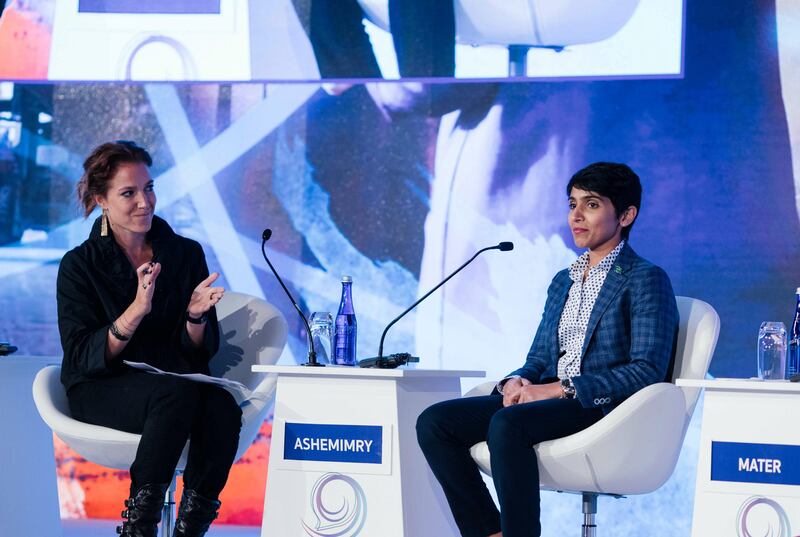Before the start of a busy week at the UN General Assembly, students, youth activists and officials met in New York on Friday to brainstorm for ways to counter extremism, foster more inclusive societies, develop sustainable urban environments and tackle challenges facing refugees.
Organised by the Misk Foundation, the philanthropic foundation founded by Saudi crown prince Mohammed bin Salman, and the United Nations Development Programme (UNDP), the event focused on delivering development goals by 2030 – both those set by the crown prince's Saudi Vision 2030 and the UN's Sustainable Development Goals.
Fahd Hamidaddin, senior adviser with Misk, said in his opening address that the aim was to "discover, develop and empower Saudi and Arab youth to be active participants in the global knowledge economy", as part of a wider effort to engage in global issues that affect them and their peers.
Against the backdrop of Manhattan’s Plaza hotel, attendees spoke of dreams and challenges for the coming generation. They came from more than 60 countries, with a large presence of Arab youth, including the presidents of Arab student associations in Columbia and Harvard.
Addressing the morning session, Michael Bloomberg, founder of Bloomberg LP and Bloomberg Philanthropies and three-term mayor of New York City, had a clear message — millennials were largely "metropolitans", who lived in urban areas attracting the best talent but who also had a responsibility to ensure a better future. Mr Bloomberg called for cities to work together to come up with solutions based on "metropolitan values" of "inclusion and diversity".
It was both a high-powered and high energy forum. Students from Al Ahsa region in Saudi Arabia’s Eastern province rubbed shoulders with Cecilia Sarkozy, the ex-wife of the former French president, while well known Saudi figures like Princess Reema bint Bandar and Badr Al Asaker, the secretary general of Misk, attended the day-long event. In a sign of the times, attendees were instructed to download the event’s app instead of being given printed schedules, and business card exchanges were barely seen as "friending" on Facebook was deemed the best way to connect.
In addition to the keynote by Mr Bloomberg, former US secretary of state Madeleine Albright, UNDP administrator Achim Steiner and UN assistant secretary general Mourad Wahba also spoke, although the stage was given mainly to younger high achievers.
Unlike at many youth forums, the 20 young speakers at the Misk-UNDP event addressed key challenges facing the world, from the need for more inclusive societies to climate change, rather than "youth issues".
One of the main points stressed was that violent extremism cut across communities around the world, from Kawthar Al Abrash, a prominent Saudi writer whose son was killed while trying to stop a terrorist attack, to 19-year-old Iraqi Ahmed Badr, who fled to the US after his family home in Baghdad was bombed and today documents the oral histories of refugees resettled in the US.
Misk, through this forum and its increased activities in Saudi Arabia and abroad, says it is seeking to "provide an alternative" to extremist narratives and propaganda, rather than focus on simply countering it.
Just a few hours after the Tube attack at Parsons Green in London, the 400 participants took a pledge to counter extremism. Led by Bjorn Ihler, a survivor of the attack on Utoyo Island in Norway in 2011, declaring loudly: "I pledge to be extremely together."
Nicola Benyahia, whose 19-year-old son Rasheed joined ISIL and died in Syria, spoke was among the speakers to address countering extremism and supporting families in tackling this challenge.
She told the The National there was need for those with "a gut feeling to come forward - the earlier we tackle it, the less difficult it is to stop radicalisation. We need early intervention."
A therapist who works with 14 to 25-year-olds, Ms Benyahia set up the Families for Life foundation last November and offers counselling for families going through the "deradicalising processes and also grieving".
She spoke of a gap that need to be filled, between state efforts to counter extremism and the families and communities of extremists. "There is a missing middle, where families even if they are concerned, there is no safe place for them to speak about it openly … so they come seek me out," she said. "If I am concerned, I always direct them to the authorities."
Surprisingly, Ms Benyahia says, "One of the things families tell me consistently, when they go to see authorities, they feel they are not heard and often seen as over-reacting."
Explaining her decision to speak publicly about her son joining ISIL, Ms Benhayia spoke of her four daughters.
"I didn’t want my daughters to be impacted by shame. I grew up with shame with an alcoholic mother and domestic violence, and I know how paralysing and difficult it can be. I didn’t want my daughters to be suddenly stuck in their lives. Nothing will replace my son but I wanted them to live on."
Such planning for the future sets the stage for the week ahead in New York, as world leaders gather to discuss extremism and other issues and also take stock of progress towards the Sustainable Development Goals.
___________________________________
[ Read more: The week ahead at the UN General Assembly ]
____________________________________






